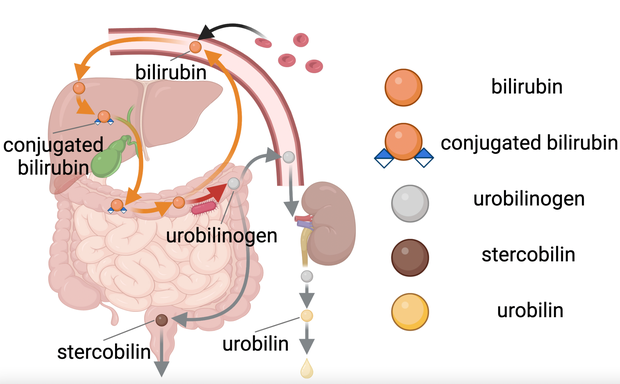Ever wonder why urine is yellow? Researchers say they've figured it out.
Ur-ine luck if you've always wondered why pee is yellow.
Researchers identified the enzyme responsible for urine's color, unraveling a mystery that's puzzled scientists for years, according to a study published Wednesday in the journal Nature Microbiology.
"It's remarkable that an everyday biological phenomenon went unexplained for so long, and our team is excited to be able to explain it," Brantley Hall, an assistant professor in the University of Maryland's Department of Cell Biology and Molecular Genetics, said in a news statement.
What makes urine yellow?
Urine is a combination of water, electrolytes and waste that your kidneys filter out from your blood. More than 125 years ago, scientists identified urobilin as the yellow pigment in urine, but they didn't know what was responsible for the urobilin's production.
It turns out urine's color is connected to the body's red blood cells, researchers said. As red blood cells degrade, a bright orange pigment called bilirubin is produced. The pigment is typically secreted into the gut, where it can then be excreted or partially reabsorbed. Once the bilirubin arrives in your gut, the microorganisms in your intestines can convert the bilirubin into other molecules, the study found.
"Gut microbes encode the enzyme bilirubin reductase that converts bilirubin into a colorless byproduct called urobilinogen," Hall, the study's lead author, said. "Urobilinogen then spontaneously degrades into a molecule called urobilin, which is responsible for the yellow color we are all familiar with."
The study authors said that before their research, scientists thought there were multiple enzymes involved, rather than a single enzyme.
Where do scientists go from here?
The discovery of the bilirubin reductase enzyme could help researchers learn more about gut health, inflammatory bowel disease and jaundice, researchers said.
The research team discovered that the enzyme is present in almost all healthy adults, but is frequently missing from newborns and people with inflammatory bowel disease.
"Now that we've identified this enzyme, we can start investigating how the bacteria in our gut impact circulating bilirubin levels and related health conditions like jaundice," study co-author and National Institutes of Health investigator Xiaofang Jiang said. "This discovery lays the foundation for understanding the gut-liver axis."
What it means if your urine isn't yellow
Urine from a healthy, hydrated person should be somewhere between colorless, which may be a sign you're drinking too much water, and the color of light straw and honey, according to the Cleveland Clinic. It turns a darker yellow or amber in those who aren't drinking enough.
Other colors can come from your diet or medical conditions.
Dark brown urine could be a sign of dangerous dehydration, according to the Cleveland Clinic. The color could also mean there's bile in your urine, which is a sign of liver disease.
Orange urine is also sometimes a sign of dehydration, but it may also mean you have a liver or bile duct condition. The color could also be tied to food dye or medications.
Certain foods and medications can also lead to blue or green urine. According to a Harvard Health post, the antidepressant amitriptyline and the anti-inflammatory drug indomethacin can turn urine blue.
Pink to reddish color could be a cause for concern, or it could just mean you've been eating beets, blueberries or rhubarb. If those foods haven't been in your diet and your urine is still pink or reddish, there may be cause for concern. The color could be a sign of several conditions, including kidney disease, lead poisoning and certain types of cancer.
for more features.




